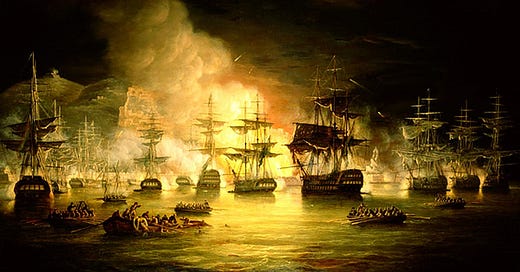Jefferson at a Crossroads: Domestic and International Influence in the 1780s
A battle for religious liberty at home and abroad
Introduction
In the 1780s, Thomas Jefferson and his country were at a crossroads. The United States had endured years of war throughout the second half of the previous decade and into the years that followed. In 1783, the nation achieved official independence with the Treaty of Paris. It nevertheless operated under a precarious and weak national government under the Articles of Confederation, which essentially acted as a single-branch legislative body with little to no power over the individual states. Once the war was won and independence achieved, it faced new challenges in the form of economic crises at home and abroad. It likewise struggled with a lack of naval power to regulate and protect its commercial shipping interests. Tensions among states and between states and the national government festered. The principal author of the Declaration of Independence also found himself in an era of transformation and crisis. Thomas Jefferson had begun the 1780s as Virginia’s governor, a role he did not perform well. He found himself a target of ridicule when he was forced to flee his own home of Monticello to evade British soldiers in 1780. The death of his wife, Martha, in 1782 was a devastating loss to him. She had fallen ill following the birth of their youngest daughter, Lucy Elizabeth, and died a few months later. On her death bed, she asked her husband never to remarry, unwilling to imagine another woman raising her children. Lucy Elizabeth died two years later, when Jefferson had just removed himself to Europe to conduct diplomatic negotiations on behalf of his country.
In this context, as Jefferson worked with Benjamin Franklin and John Adams in negotiations with European and North African states to secure treaties of amity and commerce, he was appointed as Franklin’s replacement in the role of Plenipotentiary (Minister) to France. France had been the United States’ earliest and most important ally during the American Revolution. It was the first to recognize U.S. independence from Britain and offered essential naval power that made American victory possible. Though not the celebrity of Franklin, Jefferson’s status as a prominent member of the Continental Congress during the war, and coming from the influential state of Virginia, made him well-suited to the role of minister to France. His reputation for being an important theorist on the vanguard of political philosophy ingratiated him to fellow Enlightenment thinkers in Paris. Throughout the rest of the 1780s, the direction of Jefferson’s native home was maneuvered in several ways through his diplomatic work and from his temporary home in Paris. From this geographic and ambassadorial position, Jefferson stoked the flames of republicanism and revolution among French contemporaries, came to recognize the significance of military strength in international relations, and—perhaps most important of all—championed secular governance on both sides of the Atlantic by challenging theocratic tendencies both in Virginia as well as on the world stage.
Keep reading with a 7-day free trial
Subscribe to History is Human to keep reading this post and get 7 days of free access to the full post archives.




